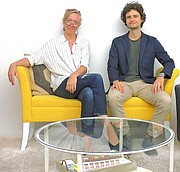TECHNOLOGY
ShareCloth Streamlines On-Demand Apparel Manufacturing
For New York–based technology company ShareCloth, shifting clothing manufacturing toward more efficient digital practices is at the core of its business model. The 4-year-old cloud-based solution recently unveiled an innovative, new approach to on-demand apparel making.
“ShareCloth is a software solution that helps apparel retailers to start selling on-demand,” said Sergey Moliavko, the company’s chief executive officer. “It’s a multipurpose solution to digitize the style after product development is uploaded to the ShareCloth cloud before the manufacturing process.”
With its on-demand application for apparel manufacturing, ShareCloth allows designers to share designs with retailers who then place orders with manufacturers. Only the requested number of units is produced. Once production is complete, apparel is delivered for retailers to distribute to customers.
“We are trying to support localization,” Moliavko said. “We need to deliver capsule collections fast. We can’t wait two to six months for the shipments from overseas.”
Before introducing its latest technology, ShareCloth invited 40 women to test the new offering as an on-demand shopping experience.
“We had 91 percent satisfaction on the fit and more than 89 percent satisfaction overall,” Moliavko said. “Out of 40 dresses, I believe only one person wasn’t satisfied. Compared to regular ecommerce—we had no returns.”
Using the mobile iPhone application, the subjects chose the fabric and color for a dress design. The women’s measurements were entered into the application, and fit could be customized using a body avatar. Through the avatar tool, each woman created a dress size that more closely reflected her own body by uploading two selfies.
“The technology works pretty easily. When you have the solution connected to your e-commerce, if the customer wants to purchase a dress, we provide precise virtual fitting,” Moliavko explained. “Once the size is validated, we share the size with the manufacturer, so it can start manufacturing.”
During this demonstration phase, ShareCloth’s on-demand platform registered a Net Promoter Score of 75 percent, an impressive accomplishment for made-to-order apparel manufacturing that was still in its testing stage.
At Hello World, a design and development studio located in downtown Los Angeles that has partnered with ShareCloth, Chief Executive Officer Tricia Hoke specializes in guiding new designers through launching their brands with a focus on small-batch production.
“We try to consult designers who are starting their business or, in the midst of their business, we help them pull it together so they’re not investing huge amounts of inventory,” she said. “I am trying to build a self-guided way for people to come in and connect with Sergey, and we provide the physical parts that you can’t really automate.”
With the introduction of ShareCloth, Hoke hopes to promote communication within the apparel industry to work toward a more collaborative environment. As apparel manufacturing transitions into more efficient production methods, she recognizes the challenges of moving away from the old model but is optimistic about her partnership with Moliavko.
“People want to try this made-to-order, on-demand model, but they still have to go through a development phase and figure it out,” she said. “It’s a huge benefit to have somebody like Sergey’s company who can install those APIs (application programming interfaces) with the measurements, send the orders straight to us and we’re ready to get going.”
The digitization of apparel manufacturing is creating an easier, streamlined process once designers, retailers and manufacturers learn to adapt. By connecting with other technologies that are solving e-commerce issues, ShareCloth has created a more seamless platform for an integrated solution.
“We already have a plugin for Shopify and Squarespace, which are really popular for small brands,” Moliavko said. “It can also be integrated into Magento for larger brands and any other commerce engine for 30 minutes’ work by a developer.”
The technology is offered through an annual $1,200 subscription model, which requires a fee of 5 percent of the production cost and a 2.5 percent transaction charge for ShareCloth’s smaller clients.
Building momentum through working with smaller partners, ShareCloth is ready to expand and Moliavko plans to officially launch the on-demand product this September. He looks forward to showing how apparel corporations can also benefit from this technology.
“We started with small brands because we believe small fashion will benefit from on-demand, but at the same time, enterprise-level brands like Nike or Adidas will work to deliver more customized pieces to their customers,” he said.
Considering the waste often produced during traditional apparel manufacturing, this cost seems small. Through ShareCloth’s more sustainable on-demand model, waste can be reduced.
“One of the key problems of the industry is sustainability,” Moliavko said. “Right now, the world produces approximately 150 billion textile pieces per year. More than 20 percent is never sold.”
When customers are offered a model based on virtual fitting that affords more customizable apparel, they are more likely to be satisfied with their final purchases, which supports a more environmentally sound apparel industry.
“The manufacturing flow is old fashioned for the 21st century,” Moliavko said. “We need more dynamic technologies to fulfill the demands for today’s customer of the 21st century.”























